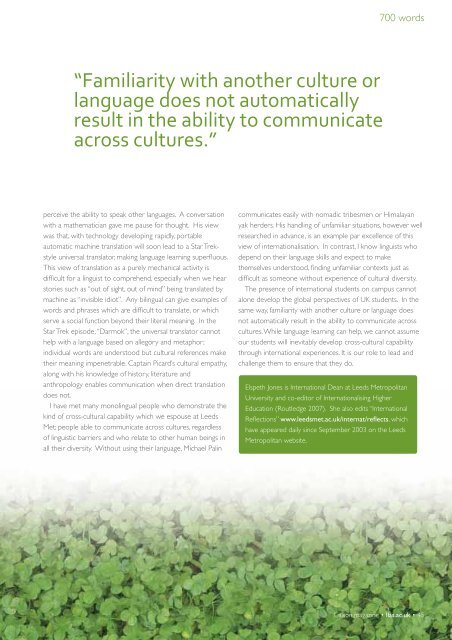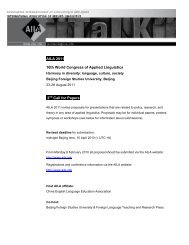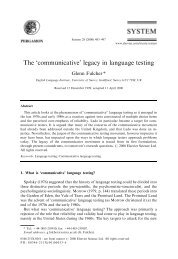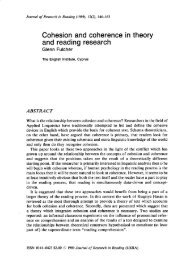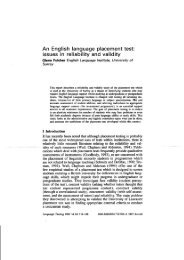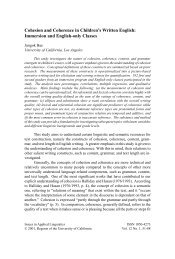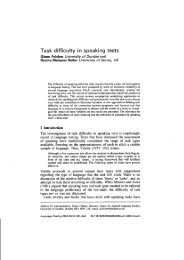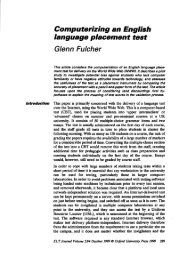Liaison Magazine - LLAS Centre for Languages, Linguistics and ...
Liaison Magazine - LLAS Centre for Languages, Linguistics and ...
Liaison Magazine - LLAS Centre for Languages, Linguistics and ...
Create successful ePaper yourself
Turn your PDF publications into a flip-book with our unique Google optimized e-Paper software.
700 words<br />
“Familiarity with another culture or<br />
language does not automatically<br />
result in the ability to communicate<br />
across cultures.”<br />
perceive the ability to speak other languages. A conversation<br />
with a mathematician gave me pause <strong>for</strong> thought. His view<br />
was that, with technology developing rapidly, portable<br />
automatic machine translation will soon lead to a Star Trekstyle<br />
universal translator, making language learning superfluous.<br />
This view of translation as a purely mechanical activity is<br />
difficult <strong>for</strong> a linguist to comprehend, especially when we hear<br />
stories such as “out of sight, out of mind” being translated by<br />
machine as “invisible idiot”. Any bilingual can give examples of<br />
words <strong>and</strong> phrases which are difficult to translate, or which<br />
serve a social function beyond their literal meaning. In the<br />
Star Trek episode,“Darmok”, the universal translator cannot<br />
help with a language based on allegory <strong>and</strong> metaphor;<br />
individual words are understood but cultural references make<br />
their meaning impenetrable. Captain Picard’s cultural empathy,<br />
along with his knowledge of history, literature <strong>and</strong><br />
anthropology enables communication when direct translation<br />
does not.<br />
I have met many monolingual people who demonstrate the<br />
kind of cross-cultural capability which we espouse at Leeds<br />
Met; people able to communicate across cultures, regardless<br />
of linguistic barriers <strong>and</strong> who relate to other human beings in<br />
all their diversity. Without using their language, Michael Palin<br />
communicates easily with nomadic tribesmen or Himalayan<br />
yak herders. His h<strong>and</strong>ling of unfamiliar situations, however well<br />
researched in advance, is an example par excellence of this<br />
view of internationalisation. In contrast, I know linguists who<br />
depend on their language skills <strong>and</strong> expect to make<br />
themselves understood, finding unfamiliar contexts just as<br />
difficult as someone without experience of cultural diversity.<br />
The presence of international students on campus cannot<br />
alone develop the global perspectives of UK students. In the<br />
same way, familiarity with another culture or language does<br />
not automatically result in the ability to communicate across<br />
cultures.While language learning can help, we cannot assume<br />
our students will inevitably develop cross-cultural capability<br />
through international experiences. It is our role to lead <strong>and</strong><br />
challenge them to ensure that they do.<br />
Elspeth Jones is International Dean at Leeds Metropolitan<br />
University <strong>and</strong> co-editor of Internationalising Higher<br />
Education (Routledge 2007). She also edits “International<br />
Reflections” www.leedsmet.ac.uk/internat/reflects, which<br />
have appeared daily since September 2003 on the Leeds<br />
Metropolitan website.<br />
<strong>Liaison</strong> magazine • llas.ac.uk •45


